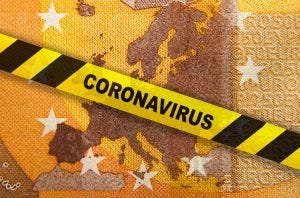
One billion doses: CureVac gains $88m to support capacity for COVID-19 mRNA vaccineOne billion doses: CureVac gains $88m to support capacity for COVID-19 mRNA vaccine
CureVac has received a grant from the European Commission to expedite construction of a plant set to make a potential mRNA vaccine against coronavirus.

CureVac – the German biotech at the center of a Donald Trump acquisition rumor – has received a grant from the European Commission to expedite construction of a plant set to make a potential mRNA vaccine against coronavirus.
The European Commission (EC) offered up to €80 million ($88 million) of financial support to German firm CureVac this week in its efforts to support the development and manufacture of a potential vaccine to treat the novel coronavirus (COVID-19). At the time of writing, the disease – labelled as a pandemic by the World Health Organization (WHO) – has killed 8,247 globally.
The investment will be used to support CureVac’s fourth manufacturing suite at its site in Tübingen, Germany, intended to support production of the firm’s messenger RNA (mRNA) vaccine candidate for COVID-19, management said on a press call Tuesday.

Image: iStock/Oleksandr Siedov
“We are very grateful to the EU commission for the financing and this will help us further expand our capacities,” Florian von der Mülbe, chief production officer and co-founder said. “We will use it to speed up production of the suite already under construction.”
CureVac, one of the earliest entrants in the mRNA space, has three manufacturing suites capable of producing mRNA material. The third received manufacturing authorization from the European Medicines Agency (EMA) last December, and according to the firm this is already producing vaccine material aimed at combatting coronavirus.
This suite, according to Mariola Fotin-Mleczek, chief technology officer, could provide up to 10 million doses per campaign of a potential coronavirus vaccine, based on the dose volume CureVac experienced in its rabies vaccine trials. The fourth suite under construction would fall in the “billion doses range,” she said on the call.
The firm’s mRNA platform is based on its in-house nucleotide sequence library and its carrier molecules: both lipid nanoparticle (LNP) – developed in partnership with Acuitas Therapeutics and Arcturus Therapeutics – and its own CureVac Carrier Molecule (CVCM). The firm received an $8.3 million grant from the Coalition for Epidemic Preparedness Innovations (CEPI) in January to develop a vaccine platform against COVID-19. Phase I trials are expected to begin in early summer, the firm said.
CEPI has also funded a project to help develop CureVac’s ‘RNA printer.’ The $34 million funding last year aims to deliver a transportable, down-scaled, automated mRNA printing facility, providing LNP-formulated mRNA vaccine candidates for rapid response to new and previously unknown pathogens.
‘Un-Presidented’ response
EC president Ursula von der Leyen said yesterday: “[CureVac is] working on a patent that has been approved and gone through the specific processes that are necessary, so they are highly specialized in this field. And it is their prediction that they might be able towards fall to have a vaccine that is fighting coronavirus.”
Like CureVac’s press conference, von der Leyen’s words were in response to allegations that US president Donald Trump had attempted to acquire the company and secure the potential vaccine for exclusive use in the US last weekend, after now former CEO Daniel Menichella visited the White House.
CureVac told press that while it was honored to have been invited as the sole German company at a meeting with various pharma firms at the White House to discuss potential coronavirus therapies and vaccines, but it rejected any rumor of a buy-out attempt by Trump or any US government organization.
“COVID-19 is an international virus and should be fought on an international basis,” said Franz-Werner Haas, Deputy CEO.
mRNA and COVID-19
CureVac is not alone in developing a vaccine based on messenger RNA.
This week, a Phase I study evaluating Moderna Therapeutics’ investigational mRNA vaccine mRNA-1273 began at Kaiser Permanente Washington Health Research Institute (KPWHRI) in Seattle.
The rapid move into clinical trials is due to information garnered in studies for related viruses including SARS (Severe Acute Respiratory Syndrome) and MERS (Middle East Respiratory Syndrome), Dr Muhammad Munir, lecturer in molecular virology at Lancaster University, explained on UK-based radio station LBC Tuesday.
“Jumping directly into the volunteer Phase I trial is pretty unique, but [applicable in this case] given the safety we’ve learnt over the years with SARS and MERS. It’s moving on pretty fast on different stages after development.”
Still, it will be at least eight months until such a vaccine could become available, though Munir explained that while this sounds like a long time in the current environment, “within the vaccinology field this is the shortest time you can count on for availability of a vaccine.”
Meanwhile, Pfizer has teamed up with Germany’s BioNTech SE for a potential mRNA-based coronavirus vaccine. The letter of intenet, announced Tuesday, aims to accelerate development of BioNTech’s potential first-in-class COVID-19 mRNA vaccine program, BNT162, expected to enter clinical testing by the end of April 2020.
“This is a global pandemic, which requires a global effort,” said Ugur Sahin, CEO of BioNTech. “In joining forces with our partner Pfizer, we believe we can accelerate our effort to bring a COVID-19 vaccine to people around the world who need it.”
About the Author
You May Also Like
schedl_b_and_w.jpg?width=100&auto=webp&quality=80&disable=upscale)
schedl_b_and_w.jpg?width=400&auto=webp&quality=80&disable=upscale)



